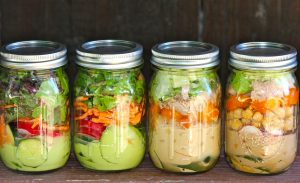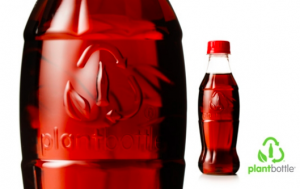After reading Aylin’s blog post about Lauren Singer, an NYU graduate who is successfully living a zero waste lifestyle, I have been thinking about how to incorporate some of her tips into my life. The one thing that she has eliminated completely from her consumer habits is plastic.
She makes it sound quite easy- but since I started paying close attention, I have realized that my life is plagued with plastic. Whenever I buy groceries there is always something I need that is only available in plastic packaging. As a vegetarian, tofu is a staple in my diet, but I have yet to come across a tofu product that isn’t sealed in plastic wrap. While I have eliminated a huge portion of my previous plastic  consumption, I realized that my reusable tupperware are almost entirely plastic.
consumption, I realized that my reusable tupperware are almost entirely plastic.
Lauren’s solution for this problem is glass- mostly in the form of a mason jar. On her blog she claims that getting rid of plastic is a crucial part of becoming more environmentally friendly because plastic is toxic.
My curiosity however is what makes glass non-toxic or better? Is it the ingredients, the production, the longevity? I decided to look into this, and this is what I discovered:
- Glass maintains it’s longevity. If recycled properly, it can be turned into more glass over and over- unlike plastic. Plastic loses its integrity- a plastic container cannot be recycled once again into a plastic container. It has to be downcycled, into a different product such as: plastic plumber and carpet padding.
- When you are using a plastic container, packaging or anything of the sort, you know that it is entirely new. This means that all new resources go into making it.
- Because plastic is made of entirely new resources, its production has greater impact on the environment.
- Using recycled glass means that manufacturers furnaces can run at lower temperatures and for every 6 tonnes of recycled glass used, CO2 emissions drop a tonne.
- Glass does not have the estrogen-mimicking chemical bisphenol A (BPA) which is responsible for a number of negative health effects such as: breast cancer, heart disease and obesity. Aside from the health consequences, man made chemicals are much more difficult to break down, which cause them to build up indefinitely in our systems.
- A downside of glass however is that it is heavier, so transportation is significantly more expensive.
While looking into this, I also discovered that some innovation has taken place involving plants in plastic bottles. Coke now has bottles that are made up of 30% plant matter. Despite this, it does seem quite clear why glass is a more favourable option than plastic regarding sustainability.

Hi!
This blog post is really interesting. I didn’t know glass had so many benefits over using plastic. Knowing this, I find it frustrating that so many foods in the supermarket are packaged in plastic containers.
I also find it quite sad that even if we all started to buy glass products, there are so many plastic containers out there in the world that already exist. For example, I think about my mother’s kitchen and I don’t know what will happen with all the plastic containers she already has there when she dies.
I will definitely try to buy glass containers in the future if I need them, thank you for the information!